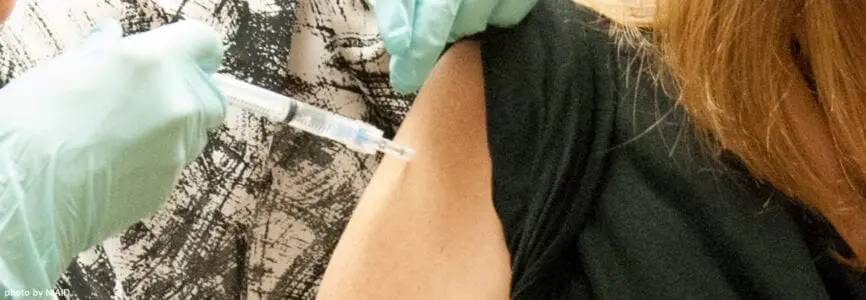Bioethics Forum Essay
New York’s Measles Outbreak: Take Off Your Shoes and Roll Up Your Sleeve
Today’s New York Times reported a rare outbreak of measles in New York City. Because the disease was mostly eradicated by 2000, most clinicians were baffled by the high fevers, rash, and respiratory ailments associated with the illness.
I remember measles well. My sister came home from school red, itchy, and feverish. The next morning I woke, delighted to be covered with red dots, able to stay home from school and watch Captain Kangaroo. This was 1964 and catching measles was an accepted ritual of childhood along with mumps and chicken pox. I am fairly sure none of us realized that measles carried potentially dangerous complications that include pneumonia, brain inflammation and possibly death.
The recent measles outbreak should be a wake-up call for both clinicians and patients to take their immunizations seriously. According to the Center for Disease Control, most measles enters the United States by citizens who recently traveled abroad, as well as foreign visitors coming into the country. Meanwhile a longstanding controversy in the U.S. concerns parents who choose to not have their children vaccinated for fear that the MMR (measles, mumps, and rubella) vaccine causes autism.
The most recent studies performed here and abroad have not found a link to autism. A single study from Britain published in The Lancet 1998 linked the MMR vaccine with autism. The journal retracted the study on grounds of scientific misconduct and financial conflicts of interest and the results have not been replicated. Unfortunately, the repercussions from the study continue to negatively influence parent’ attitudes toward vaccination.
In most states, there is a provision allowing children to attend school without vaccinations depending on religious principles. Nearly all states allow students to attend school with a religious and philosophical objection to immunizations. New York State provides for religious exemptions only.
Health care providers and school officials need to do a better job of getting the message out that vaccinations save lives, while respecting private beliefs. Parents can also recognize an ethical responsibility to think not just of their children, but of every other child or adult they come into contact with. Meanwhile, anyone presenting with rash, fever, and cough should be triaged to a separate waiting room, and required to wear a mask until pronounced infection free. The school nurse should do the same.
United States citizens traveling to foreign countries with dangerous diseases are required to receive multiple vaccinations and may even need to take prophylactic medications with possibly serious side effects. We take our diseases seriously and go to great lengths to protect our citizens abroad. The U.S. should adopt a pre-emptive position on foreigners entering the country, delaying entry for those without immunizations records. Maybe we can set up medical outposts in our airports offering free immunizations. If we want to stop the spread of disease across the planet, we can start with the ports of entry. People already take off their shoes, belts and jackets. Let’s have them roll up their sleeves as well.
Karyn L. Boyar is a nurse practitioner and clinical instructor at New York University College of Nursing.
Posted by Susan Gilbert at 03/19/2014 01:44:19 PM |













